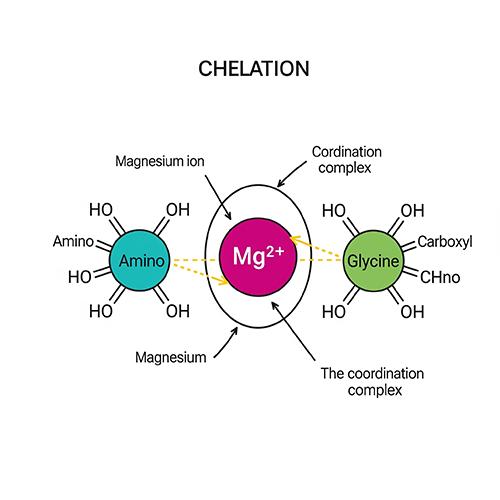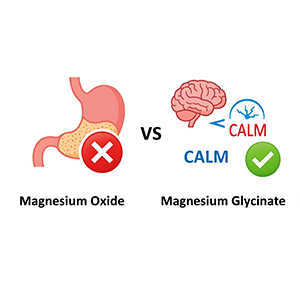Contents
- 1 What is Magnesium Glycinate Powder? Understanding This Easy-to-Absorb Magnesium
- 2 The Great Benefits of Magnesium Glycinate Powder
- 3 How to Choose and Use Magnesium Glycinate Powder

Are you tired of restless nights, constant stress, or nagging muscle aches? You’re not the only one. These common problems are often linked to not getting enough magnesium. While there are many magnesium supplements out there, one type often comes out on top for being easy on your system and highly effective: magnesium glycinate powder.
This guide will show you what magnesium glycinate powder is, how it can help you sleep better, feel less anxious, and boost your overall health. We’ll also give you practical tips on how to make it part of your daily routine. By the end of this, you’ll see why this easily absorbed form of magnesium could be what you’ve been missing for a calmer mind, better sleep, and more energy. Let’s help you find a healthier, more peaceful you.
What is Magnesium Glycinate Powder? Understanding This Easy-to-Absorb Magnesium
To get why magnesium glycinate powder is so helpful, it’s important to know why magnesium itself is crucial. Our bodies can’t make magnesium, so we have to get it from food or supplements. It’s a vital nutrient involved in over 300 essential bodily processes, like nerve function, muscle movement, blood sugar control, and energy creation. So, what’s special about magnesium glycinate? It’s a form of magnesium that’s bonded to glycine, an amino acid. This combination is key to its effectiveness.

Here’s why this form is often a better choice:
- Absorbs Really Well: Many magnesium supplements, like magnesium oxide, don’t absorb well and can cause stomach upset before your body can even use the magnesium. Magnesium glycinate, however, is much easier for your body to absorb. The glycine helps carry the magnesium into your bloodstream so your body can make the most of it. This means more magnesium gets where it needs to go with less waste.
- Gentle on Your Stomach: A common issue with some magnesium supplements is that they can have a laxative effect. Because magnesium glycinate absorbs so well and includes glycine, it’s very gentle on your digestive system. It’s much less likely to cause stomach upset compared to forms like magnesium citrate (in large doses) or magnesium oxide, making it great for people with sensitive stomachs.
- Extra Benefits from Glycine: Glycine isn’t just there to help with absorption; it has its own benefits. Glycine is an amino acid that has a natural calming effect on the nervous system. This teamwork between easily absorbed magnesium and calming glycine boosts the supplement’s ability to help you relax and sleep better.
While other types of magnesium have their uses, here’s a quick comparison to show why glycinate is often preferred:

- Magnesium Oxide: Often found in cheaper supplements, as little as 4% may be absorbed. It’s often used for its laxative effect rather than for boosting overall magnesium levels.
- Magnesium Citrate: Easier to find and generally better absorbed than oxide, it’s often used to help with bowel regularity because it can have a mild laxative effect.
- Magnesium L-Threonate: A newer type designed to help with brain function because it can easily reach the brain. While good for the brain, it’s not as widely known for general relaxation and sleep as glycinate.
For those looking for relaxation, better sleep, and a good source of magnesium without stomach upset, magnesium glycinate powder is often the top pick for health professionals and users.
The Great Benefits of Magnesium Glycinate Powder
The powerful mix of easily absorbed magnesium and calming glycine makes magnesium glycinate powder a strong helper for common health issues today. Let’s look at its benefits:
Helps You Relax and Reduces Anxiety: Magnesium is key for managing neurotransmitters, which are the brain’s chemical messengers controlling mood and stress. It helps activate GABA (Gamma-aminobutyric acid), a neurotransmitter that calms the nervous system. Good GABA levels can lower feelings of anxiety, nervousness, and even panic. Glycine’s natural calming effect adds to this, helping to quiet a busy mind and create a deep sense of calm. Studies show magnesium supplements can help reduce anxiety symptoms and improve mood in those with mild to moderate anxiety.

Improves Sleep Quality and Fights Insomnia: One of the best-known benefits of magnesium glycinate powder is its positive effect on sleep. Magnesium helps improve sleep in several ways:
It helps control the production of melatonin, the hormone that tells your body it’s time to sleep. It calms nerve activity in the brain by binding to GABA receptors, which helps you fall asleep and stay asleep. Studies have shown that glycine can improve sleep quality by lowering core body temperature and reducing the time it takes to fall asleep. It also helps people spend more time in deep, restorative sleep. Many users report falling asleep faster, waking up less during the night, and feeling more refreshed in the morning after adding magnesium glycinate powder to their evening routine.
Supports Muscle Relaxation and Eases Cramps: Magnesium is essential for muscles to work properly, acting as a natural way to help muscles relax after they contract. Not enough magnesium can lead to muscle spasms, twitches, and painful cramps. Magnesium glycinate powder is very effective for these issues, offering relief for conditions like restless legs syndrome (RLS) and nighttime leg cramps. Athletes and those with sore muscles after exercise often use magnesium glycinate for its muscle-relaxing benefits.
Eases Headaches and Migraines: More and more research shows a strong link between low magnesium levels and how often and how bad headaches and migraines are. Magnesium helps with headaches in several ways, including regulating blood vessel tone, reducing inflammation, and balancing neurotransmitters involved in migraines. Evidence suggests that magnesium supplements, especially easily absorbed forms like glycinate, can help prevent migraines. For tension headaches, magnesium’s muscle-relaxing effects can also bring relief.
Promotes Strong Bones: While calcium gets a lot of attention for bone health, magnesium is just as important, if not more so. About 50-60% of your body’s magnesium is in your bones. It’s vital for bone formation and influences the cells that build and break down bone. Magnesium also helps regulate calcium and Vitamin D levels, which are both necessary for strong bones. Getting enough magnesium is key to preventing osteoporosis and keeping your skeleton strong.
Supports a Healthy Heart: Magnesium is crucial for heart health. It helps maintain a healthy heart rhythm, supports normal blood pressure by relaxing blood vessels, and helps prevent arteries from hardening. Research shows that people who get more magnesium tend to have a lower risk of heart disease, including high blood pressure and heart attacks. Magnesium glycinate’s relaxing properties also indirectly benefit heart health by reducing stress on the cardiovascular system.
How to Choose and Use Magnesium Glycinate Powder
To get the most out of magnesium glycinate powder, it’s important to pick a good product and use it correctly. Purity and quality are key! The supplement market can be confusing, with big differences in quality. When choosing magnesium glycinate powder, look for these signs of a good product:
- Third-Party Testing: Look for seals from independent groups like NSF International, USP, or ConsumerLab. These show the product has what it says it has, is free from harmful substances (like heavy metals), and meets high quality standards.
- No Artificial Fillers, Colors, or Common Allergens: Choose products with clean labels, free from unnecessary additives, artificial sweeteners, fake colors, and common allergens like gluten, soy, and dairy. This is especially important if you have sensitivities or dietary restrictions.
- Reputable Brands: Pick brands known for being transparent, using high-quality ingredients, and sourcing ethically. Check customer reviews and look for companies that share details about how they make their products. Consider brands that use patented forms like Albion® Minerals’ magnesium bisglycinate chelate, known for being pure and well-absorbed.
How Much to Take
The general recommended daily amounts (RDAs) for magnesium change based on age, sex, and life stage. For adult women, it’s usually 310-320 mg per day, and for adult men, it’s about 400-420 mg per day. However, for specific benefits like better sleep or less anxiety, you might need higher doses of magnesium glycinate.
- For General Magnesium Needs: A common starting dose is 200-400 mg of elemental magnesium per day.
- For Sleep and Relaxation: Many people find 200-400 mg taken in the evening works well. Some might need more, up to 600 mg, but it’s best to “start low and go slow” to see how your body reacts.
- Listen to Your Body: Increase your dose slowly over a few days or a week until you get the results you want without side effects. This helps you find your perfect amount.
When to Take It for Best Results: While you can take magnesium glycinate anytime, most people find it works best in the evening, about 30-60 minutes before bed. This timing helps maximize its calming and sleep-promoting effects. If you’re using it mainly for anxiety relief during the day, taking smaller doses spread out might be better.
Mixing and Drinking Tips
One of the great things about magnesium glycinate powder is how easy it is to use. It usually has no flavor or a very mild, slightly sweet taste from the glycine, making it easy to add to drinks.
- Simple to Dissolve: The easiest way is to mix your dose with 4-8 ounces of plain water. Stir until it’s fully dissolved.
- Add to Drinks: Make it part of your evening routine by adding it to herbal teas, warm milk, or other calming, decaf drinks.
- Smoothie Booster: Blend it into your morning or evening smoothie for an easy and nutritious addition.
- Temperature Note: While it dissolves well, try not to mix it with very hot liquids, as this could reduce some of its benefits. Lukewarm or cool liquids are usually best.
Magnesium Glycinate Side Effects and Important Things to Know
Magnesium glycinate is usually well-tolerated, especially compared to other magnesium types. However, like any supplement, large doses can sometimes cause:
- Mild Digestive Issues: Though less common than with magnesium citrate or oxide, too much can sometimes cause loose stools or mild diarrhea. If this happens, just take less.
- Nausea or Upset Stomach: This is rare but can happen, especially if taken on an empty stomach by very sensitive people.
Interactions with Medications
Magnesium can affect how some prescription drugs work. Be aware of possible interactions with:
- Antibiotics: Magnesium can make some antibiotics (like tetracyclines and quinolones) less effective. Take magnesium supplements at least 2-4 hours before or after these medications.
- Diuretics (Water Pills): Some diuretics can change how much magnesium your body gets rid of.
- Heart Medications: Magnesium might interact with certain heart drugs.
- Blood Pressure Medications: It could increase the effect of some drugs that lower blood pressure.
Who Shouldn’t Take It (Contraindications): People with severe kidney disease should avoid magnesium supplements unless their doctor says it’s okay and monitors them closely. Their kidneys might have trouble getting rid of extra magnesium, which could lead to problems.
Always Talk to a Healthcare Professional: Before starting any new supplement, especially if you have health conditions, are pregnant or breastfeeding, or take prescription medications, it’s very important to talk to your doctor or another qualified healthcare provider. They can give you advice based on your personal health needs. You can find more general information on magnesium from trusted sources like the National Institutes of Health or WebMD.
Adding Magnesium Glycinate Powder to Your Healthy Lifestyle
Making magnesium glycinate powder part of your daily life can be easy, especially when you see it as one piece of your overall health plan. Other ways to boost benefits include:

- Eat Magnesium-Rich Foods: Supplements should add to, not replace, a healthy diet. Eat plenty of foods rich in magnesium, like leafy green vegetables (spinach, kale), nuts (almonds, cashews), seeds
- (pumpkin, chia), beans (black beans, lentils), whole grains, avocados, and dark chocolate.
- Try Mindfulness and Meditation: To help reduce stress and anxiety, add mindfulness, meditation, or deep breathing exercises to your day. These work well with magnesium’s calming effects.
- Create a Good Sleep Routine: If better sleep is your main goal, focus on good sleep habits. This means having a regular sleep schedule, a dark, quiet, and cool bedroom, avoiding screens before bed, and limiting caffeine and alcohol in the evening. Learn more about healthy sleep from groups like the Sleep Foundation.
- Get Regular Exercise: Moderate, consistent exercise can improve sleep, reduce stress, and boost health, which goes perfectly with the benefits of magnesium.
Real-Life Examples:
- Consider Sarah, a busy professional who struggled with ongoing stress and trouble sleeping. After her doctor suggested she might be low on magnesium, she started taking 300mg of magnesium glycinate powder mixed with warm water each evening. “Within a week, I noticed a big difference,” she says. “I was falling asleep faster and staying asleep all night. My anxious thoughts before bed are much less, and I wake up feeling rested and ready for the day.”
- Or take John, a runner who often got nighttime leg cramps that messed with his training and sleep. After adding magnesium glycinate to his routine after workouts, he found major relief. “The cramps are pretty much gone,” he shares, “and my muscles feel more relaxed in general. It’s been a game-changer for my recovery.” These stories show the real, life-changing effects of getting enough magnesium with a quality supplement.
When to See a Doctor About Magnesium Glycinate
While magnesium glycinate powder is generally safe and helpful for many, it’s important to know when to get medical advice:
- If Symptoms Don’t Improve or Get Worse: If your sleep problems, anxiety, muscle cramps, or other symptoms don’t get better or even get worse after using magnesium glycinate regularly and correctly, see your doctor. There might be another medical issue that needs a different approach.
- Before Starting Any New Supplement: As mentioned before, always talk to a healthcare provider before adding any new supplement to your routine, especially if you have existing health problems (like kidney disease or heart conditions) or take prescription drugs. They can check for any issues and make sure the supplement is safe and right for you.
- To Check for Magnesium Deficiency: A doctor can order blood tests (though blood levels don’t always show the whole picture) or do other checks to see if low magnesium is causing your symptoms. This can help guide your supplement use more effectively.
Embrace a Calmer, Healthier You with Magnesium Glycinate Powder

In a world that constantly drains our mental and physical energy, finding natural and effective ways to support our health is more important than ever. Magnesium glycinate powder is a standout choice. It’s more than just a supplement; it’s an easily absorbed form of an essential mineral that can bring many health benefits, from deep sleep and calm to less muscle tension and more energy.
Its gentleness on the stomach, along with the calming benefits of glycine, makes it an excellent option for those wanting to boost their magnesium intake without unwanted side effects. By understanding its benefits, choosing a high-quality product, and making it part of your overall wellness routine, you can take a big step toward a calmer, more balanced, healthier, and more vibrant life.
HEALTH DISCLAIMER: The information on this website is for educational uses only and is not a substitute for professional medical advice. Always consult an authorized healthcare provider for any health concerns before using any herbal or natural remedy. We do not establish, treat, cure, or prevent any disease. Reliance on any material from this website is solely at your own risk. We are not responsible for any adverse effects resulting from the use of information or products mentioned on this website.
